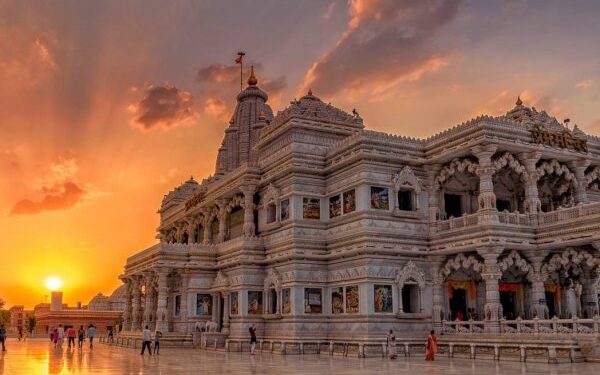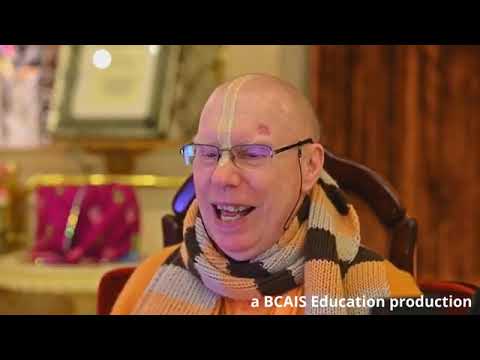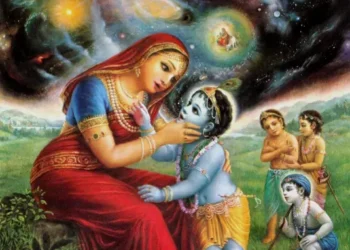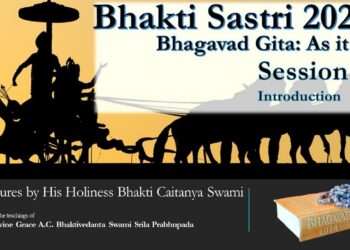Bhagavad-Gita 4.9
janma karma ca me divyam
evaṁ yo vetti tattvataḥ
tyaktvā dehaṁ punar janma
naiti mām eti so ‘rjuna
SYNONYMS
janma—birth; karma—work; ca—also; me—of Mine; divyam—transcendental; evam—like this; yaḥ—anyone who; vetti—knows; tattvataḥ—in reality; tyaktvā—leaving aside; deham—this body; punaḥ—again; janma—birth; na—never; eti—does attain; mām—unto Me; eti—does attain; saḥ—he; arjuna—O Arjuna.
TRANSLATION
One who knows the transcendental nature of My appearance and activities does not, upon leaving the body, take his birth again in this material world, but attains My eternal abode, O Arjuna.
PURPORT
The Lord’s descent from His transcendental abode is already explained in the 6th verse. One who can understand the truth of the appearance of the Personality of Godhead is already liberated from material bondage, and therefore he returns to the kingdom of God immediately after quitting this present material body. Such liberation of the living entity from material bondage is not at all easy. The impersonalists and the yogīs attain liberation only after much trouble and many, many births. Even then, the liberation they achieve—merging into the impersonal brahmajyoti of the Lord—is only partial, and there is the risk of returning to this material world. But the devotee, simply by understanding the transcendental nature of the body and activities of the Lord, attains the abode of the Lord after ending this body and does not run the risk of returning to this material world. In the Brahma-saṁhitā (5.33) it is stated that the Lord has many, many forms and incarnations: advaitam acyutam anādim ananta-rūpam. Although there are many transcendental forms of the Lord, they are still one and the same Supreme Personality of Godhead. One has to understand this fact with conviction, although it is incomprehensible to mundane scholars and empiric philosophers. As stated in the Vedas (Puruṣa-bodhinī Upaniṣad):
eko devo nitya-līlānurakto
bhakta-vyāpī hṛdy antar-ātmā
“The one Supreme Personality of Godhead is eternally engaged in many, many transcendental forms in relationships with His unalloyed devotees.” This Vedic version is confirmed in this verse of the Gītā personally by the Lord. He who accepts this truth on the strength of the authority of the Vedas and of the Supreme Personality of Godhead and who does not waste time in philosophical speculations attains the highest perfectional stage of liberation. Simply by accepting this truth on faith, one can, without a doubt, attain liberation. The Vedic version tat tvam asi is actually applied in this case. Anyone who understands Lord Kṛṣṇa to be the Supreme, or who says unto the Lord “You are the same Supreme Brahman, the Personality of Godhead,” is certainly liberated instantly, and consequently his entrance into the transcendental association of the Lord is guaranteed. In other words, such a faithful devotee of the Lord attains perfection, and this is confirmed by the following Vedic assertion:
tam eva viditvāti mṛtyum eti
nānyaḥ panthā vidyate ‘yanāya
“One can attain the perfect stage of liberation from birth and death simply by knowing the Lord, the Supreme Personality of Godhead, and there is no other way to achieve this perfection.” (Śvetāśvatara Upaniṣad 3.8) That there is no alternative means that anyone who does not understand Lord Kṛṣṇa as the Supreme Personality of Godhead is surely in the mode of ignorance and consequently he will not attain salvation simply, so to speak, by licking the outer surface of the bottle of honey, or by interpreting the Bhagavad-gītā according to mundane scholarship. Such empiric philosophers may assume very important roles in the material world, but they are not necessarily eligible for liberation. Such puffed-up mundane scholars have to wait for the causeless mercy of the devotee of the Lord. One should therefore cultivate Kṛṣṇa consciousness with faith and knowledge, and in this way attain perfection.
Bhagavad-Gita 10.34
mṛtyuḥ sarva-haraś cāham
udbhavaś ca bhaviṣyatām
kīrtiḥ śrīr vāk ca nārīṇāṁ
smṛtir medhā dhṛtiḥ kṣamā
SYNONYMS
mṛtyuḥ—death; sarva-haraḥ—all-devouring; ca—also; aham—I am; udbhavaḥ—generation; ca—also; bhaviṣyatām—of future manifestations; kīrtiḥ—fame; śrīḥ—opulence or beauty; vāk—fine speech; ca—also; nārīṇām—of women; smṛtiḥ—memory; medhā—intelligence; dhṛtiḥ—firmness; kṣamā—patience.
TRANSLATION
I [Sri Krishna] am all-devouring death, and I am the generating principle of all that is yet to be. Among women I am fame, fortune, fine speech, memory, intelligence, steadfastness and patience.
PURPORT
As soon as a man is born, he dies at every moment. Thus death is devouring every living entity at every moment, but the last stroke is called death itself. That death is Kṛṣṇa. As for future development, all living entities undergo six basic changes. They are born, they grow, they remain for some time, they reproduce, they dwindle, and finally they vanish. Of these changes, the first is deliverance from the womb, and that is Kṛṣṇa. The first generation is the beginning of all future activities.
The seven opulences listed—fame, fortune, fine speech, memory, intelligence, steadfastness and patience—are considered feminine. If a person possesses all of them or some of them he becomes glorious. If a man is famous as a righteous man, that makes him glorious. Sanskrit is a perfect language and is therefore very glorious. If after studying one can remember a subject matter, he is gifted with a good memory, or smṛti. And the ability not only to read many books on different subject matters but to understand them and apply them when necessary is intelligence (medhā), another opulence. The ability to overcome unsteadiness is called firmness or steadfastness (dhṛti). And when one is fully qualified yet is humble and gentle, and when one is able to keep his balance both in sorrow and in the ecstasy of joy, he has the opulence called patience (kṣamā).
Bhagavad-Gita 18.55
bhaktyā mām abhijānāti
yāvān yaś cāsmi tattvataḥ
tato māṁ tattvato jñātvā
viśate tad-anantaram
SYNONYMS
bhaktyā—by pure devotional service; mām—Me; abhijānāti—one can know; yāvān—as much as; yaḥ ca asmi—as I am; tattvataḥ—in truth; tataḥ—thereafter; mām—Me; tattvataḥ—in truth; jñātvā—knowing; viśate—he enters; tat-anantaram—thereafter.
TRANSLATION
One can understand Me as I am, as the Supreme Personality of Godhead, only by devotional service. And when one is in full consciousness of Me by such devotion, he can enter into the kingdom of God.
PURPORT
The Supreme Personality of Godhead, Kṛṣṇa, and His plenary portions cannot be understood by mental speculation nor by the nondevotees. If anyone wants to understand the Supreme Personality of Godhead, he has to take to pure devotional service under the guidance of a pure devotee. Otherwise, the truth of the Supreme Personality of Godhead will always be hidden. As already stated in Bhagavad-gītā (7.25), nāhaṁ prakāśaḥ sarvasya: He is not revealed to everyone. No one can understand God simply by erudite scholarship or mental speculation. Only one who is actually engaged in Kṛṣṇa consciousness and devotional service can understand what Kṛṣṇa is. University degrees are not helpful.
One who is fully conversant with the Kṛṣṇa science becomes eligible to enter into the spiritual kingdom, the abode of Kṛṣṇa. Becoming Brahman does not mean that one loses his identity. Devotional service is there, and as long as devotional service exists, there must be God, the devotee, and the process of devotional service. Such knowledge is never vanquished, even after liberation. Liberation involves getting free from the concept of material life; in spiritual life the same distinction is there, the same individuality is there, but in pure Kṛṣṇa consciousness. One should not mistakenly think that the word viśate, “enters into Me,” supports the monist theory that one becomes homogeneous with the impersonal Brahman. No. Viśate means that one can enter into the abode of the Supreme Lord in one’s individuality to engage in His association and render service unto Him. For instance, a green bird enters a green tree not to become one with the tree but to enjoy the fruits of the tree. Impersonalists generally give the example of a river flowing into the ocean and merging. This may be a source of happiness for the impersonalist, but the personalist keeps his personal individuality like an aquatic in the ocean. We find so many living entities within the ocean, if we go deep. Surface acquaintance with the ocean is not sufficient; one must have complete knowledge of the aquatics living in the ocean depths.
Because of his pure devotional service, a devotee can understand the transcendental qualities and the opulences of the Supreme Lord in truth. As it is stated in the Eleventh Chapter, only by devotional service can one understand. The same is confirmed here; one can understand the Supreme Personality of Godhead by devotional service and enter into His kingdom.
After attainment of the brahma-bhūta [SB 4.30.20] stage of freedom from material conceptions, devotional service begins by one’s hearing about the Lord. When one hears about the Supreme Lord, automatically the brahma-bhūta stage develops, and material contamination—greediness and lust for sense enjoyment—disappears. As lust and desires disappear from the heart of a devotee, he becomes more attached to the service of the Lord, and by such attachment he becomes free from material contamination. In that state of life he can understand the Supreme Lord. This is the statement of Śrīmad-Bhāgavatam also. After liberation the process of bhakti, or transcendental service, continues. The Vedānta-sūtra (4.1.12) confirms this: ā-prāyaṇāt tatrāpi hi dṛṣṭam. This means that after liberation the process of devotional service continues. In the Śrīmad-Bhāgavatam, real devotional liberation is defined as the reinstatement of the living entity in his own identity, his own constitutional position. The constitutional position is already explained: every living entity is a part-and-parcel fragmental portion of the Supreme Lord. Therefore his constitutional position is to serve. After liberation, this service is never stopped. Actual liberation is getting free from misconceptions of life.


















